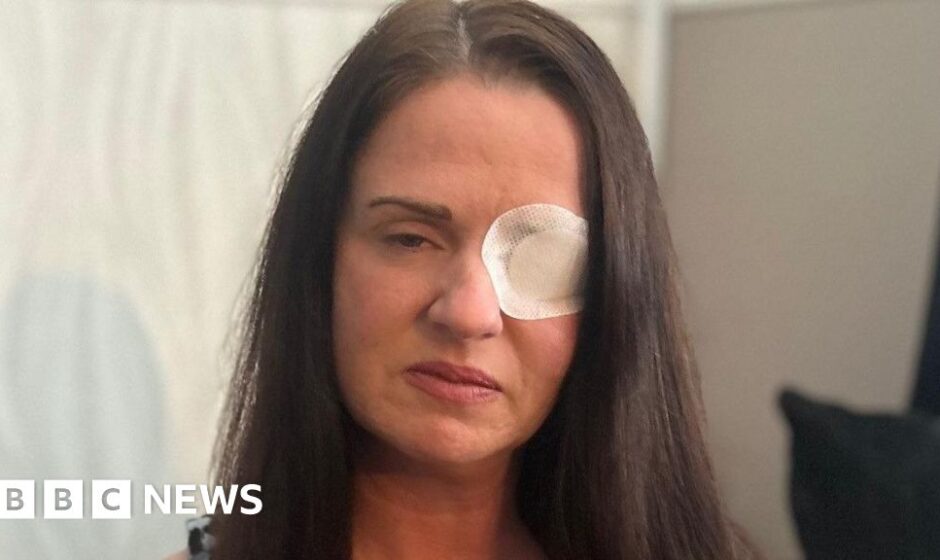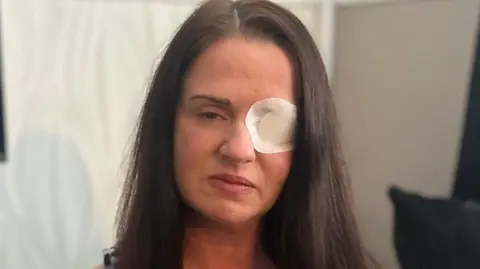 BBC
BBCAn aesthetic beautician left one woman fighting for her life and several others seriously ill in hospital after injecting them with Toxpia, an illegal Botox-type anti-wrinkle treatment. As the BBC names the woman behind the jabs, two of her victims share their stories.
The patch over Kaylie Bailey’s left eye is a daily reminder of when her beauty treatment nearly killed her.
The 36-year-old mum-of-three from Peterlee, County Durham, had paid Gemma Gray £75 for three “Botox” injections, half of what it had cost on a previous visit – the bargain turned out to be too good to be true.
Within days, Ms Bailey was struggling to see.
Doctors at Sunderland Royal Hospital were initially baffled and diagnosed her with ptosis, an eye condition characterised by the drooping of the upper eyelid, and told her to go home to rest.
The hospital trust said that when Ms Bailey was discharged she had been advised to visit her GP if her condition worsened, and it had been explained to her that her symptoms were probably related to the treatment she had had.
It added that botulinum toxicity was a very rare condition “not seen by the majority of doctors during their careers”.
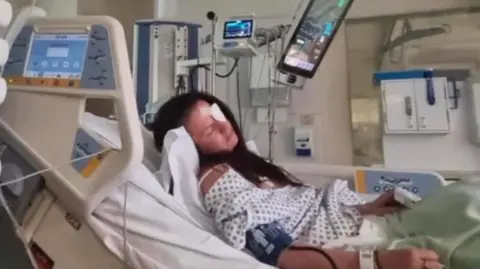 Family handout
Family handoutBut when her condition deteriorated over the following days, Ms Bailey rushed back to hospital where this time she was told she had botulism, a rare but life-threatening condition caused by a bacterium.
By that point, she was one of 28 people to have been diagnosed with the toxic poisoning in north-east England after having anti-wrinkle jabs.
Ms Bailey stopped breathing and required resuscitation.
She spent three days on the Intensive Care Unit and was treated with an anti-toxin.
“I remember lying on the bed thinking ‘I’m dying here and I don’t want to’,” Ms Bailey says, crying as she recalls her experience.
Upon her release, and being required now to wear an eye patch until her eye heals, she contacted Mrs Gray and was told by her it was a “nationwide problem with the product”.
“When I went in [to her appointment for the anti-wrinkle jabs], I felt like she was rushing that much it stung, my eyes were watering that much off it,” Ms Bailey says.
“I cannot believe she’s even dared to do that to people.
“She didn’t even know what was in it and we’re having to live with what she’s done to us.
“I’ve nearly died because of it.”
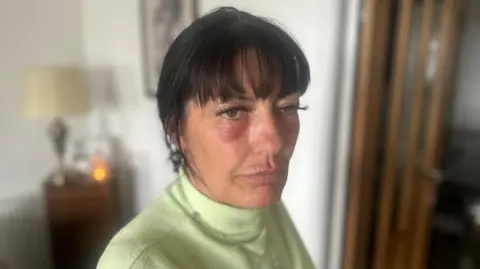
Paula Harrison suffered a similar fate when she visited Mrs Gray at a salon in Blackhall, Co Durham, in late May.
The 54-year-old mother-of-two had previously been to the practitioner for a lip-filler procedure but this time decided to have what she thought was Botox and under-eye filler.
After a few days, she too became unwell and also went to Sunderland Royal Hospital where she was admitted and spent four days, receiving an anti-toxin as part of her treatment.
The BBC has previously reported how hospitals in the region ran out of their own stocks of the anti-toxin and needed to source it from hospitals across the country because of the unusually high number of patients who were presenting with symptoms of botulism.
Mrs Harrison said her throat was closing up and she was unable to eat.
“[Mrs Gray is] playing with people’s lives,” Mrs Harrison says. “Luckily, I’m all right, but I could have been dead.”
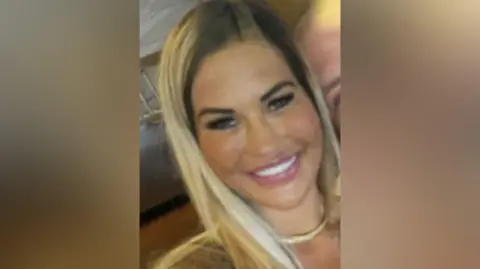 Gemma Gray
Gemma GrayMrs Gray, formerly known as Gemma Brown, operates her business Belissimo Aesthetics, which is not linked to any other business of the same name, from her home near Bishop Auckland and at a salon in Blackhall.
She administered an illegal type of botulinum toxin, the ingredient used in legal Botox-type products, to a number of patients.
There are seven such products licensed for use in the UK, including the brand Botox which is the most commonly known.
Mrs Gray used Toxpia, a product from South Korea which the Medicines and Healthcare Products Regulatory Agency says is not licensed for use in the UK and which is an offence to sell or supply.
She told clients it was a “new type of Botox” and charged between £75 and £100 for three areas of treatment.
The BBC tried to contact her to ask her about her involvement but she said she was not interested in speaking.
The BBC is naming Mrs Gray after speaking to a number of her clients.
It is understood another aesthetic practitioner, who is a business associate of Mrs Gray’s, bought the Toxpia from her and administered it to her own clients, many of whom also became ill.
‘Consider the health impacts’
Mrs Gray has told clients how sorry she is for what happened and described how bad she feels that they became ill. She told Mrs Harrison that it was a “new treatment on trial” and that she was devastated.
She also indicated it was a “nationwide” problem with the product and said people everywhere had become ill after using it.
The BBC has seen no evidence to support this claim.
Mrs Gray advertised her business as being “fully trained and insured”.
An investigation, led by the UK Health Security Agency, is ongoing.
The agency has issued guidance to anyone who wishes to have this type of treatment, advising them to research their practitioner and make sure the product they are given is a legal medicine and licensed for use in the UK.
The Department of Health and Social Care said people’s lives were being put at risk by “inadequately trained operators in the cosmetic sector” and the government was looking into new regulations.
“We urge anyone considering cosmetic procedures to consider the possible health impacts and find a reputable, insured and qualified practitioner,” a spokesperson said.
#County #Durham #women #fall #ill #fake #Botox #beautician #apologises
